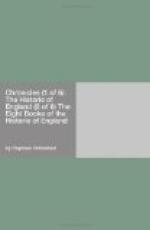The brute of such an heinous act was streightwaies blowne ouer all, and brought with speed to the eares of the noble men and peeres of the realme, which were not farre off the place where this slaughter had beene committed. Amongst other, one Osrike, for his age and wisedome accounted of most authoritie, exhorted the residue that in no wise they should suffer the death of their souereigne lord to passe vnpunished vnto their perpetuall shame and reproofe. Wherevpon in all hast they ran to the place where they knew to find Kineard, who at the first began to please his cause, to make large promises, to pretend coosenage, and so foorth: but when he perceiued all that he could say or doo might not preuaile, he incouraged his companie to shew themselues valiant, and to resist their enimies to the vttermost of their powers. Heerevpon followed a doubtfull fight, the one part striuing to saue their liues, and the other to atteine honour, and punish the slaughter of their souereigne lord. At length the victorie rested on the side where the right was, so that the wicked murtherer after he had fought a while, at length was slaine, togither with [Sidenote: Simon Dun. H. Hunt] fourescore and eight of his mates. The kings bodie was buried at Winchester, & the murtherers at Repingdon. Such was the end of king Kinewulfe, after he had reigned the tearme of 31 yeeres.
[Sidenote: Eccle. hist. Magd. 786] In the yeere of our Lord 786, pope Adrian sent two legats into England, Gregorie, or (as some copies haue) George bishop of Ostia, and Theophylactus bishop of Tuderto, with letters commendatorie vnto Offa king of Mercia, Alfwold king of Northumberland, Ieanbright or Lambert archbishop of Canturburie, and Eaubald archbishop of Yorke. [Sidenote: H. Hunt. Legats from the pope.] These legats were gladlie receiued, not onlie by the foresaid kings and archbishops, but also of all other the high estates, aswell spirituall as temporall of the land, & namelie of Kinewulfe king of the Westsaxons, which repaired vnto king Offa to take counsell with him for reformation of such articles as were conteined in the popes letters.
[Sidenote: Twentie articles which the legats had to propone.] There were twentie seuerall articles which they had to propone on the popes behalfe, as touching the receiuing of the faith or articles established by the Nicene councell, and obeieng of the other generall councels, with instructions concerning baptisme and keeping of synods yeerelie, for the examination of priests and ministers, and reforming of naughtie liuers. Moreouer touching discretion to be vsed in admitting of gouernors in monasteries, and curats or priests to the ministerie in churches: and further for the behauior of priests in wearing their apparell, namelie that they should not presume to come to the altar bare legged, lest their dishonestie might be discouered. And that in no wise the chalice or paten were made of the horne of an oxe, bicause the same is bloudie of nature: nor the host of a crust, but of pure bread. Also whereas bishops vsed to sit in councels to iudge in secular causes, they were now forbidden so to doo.




